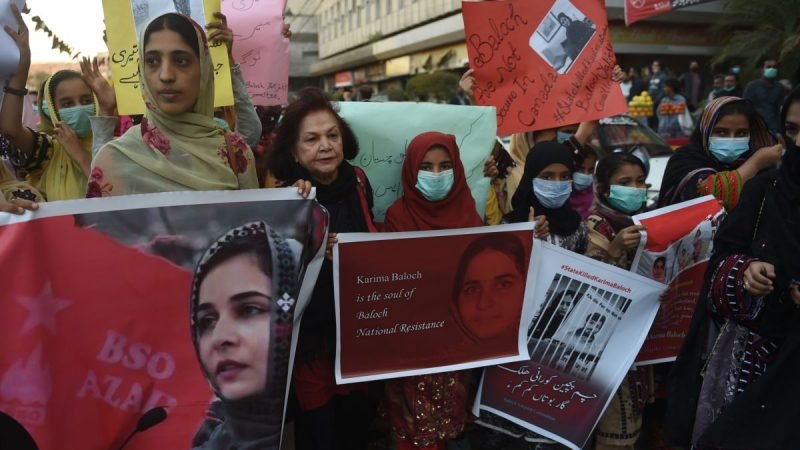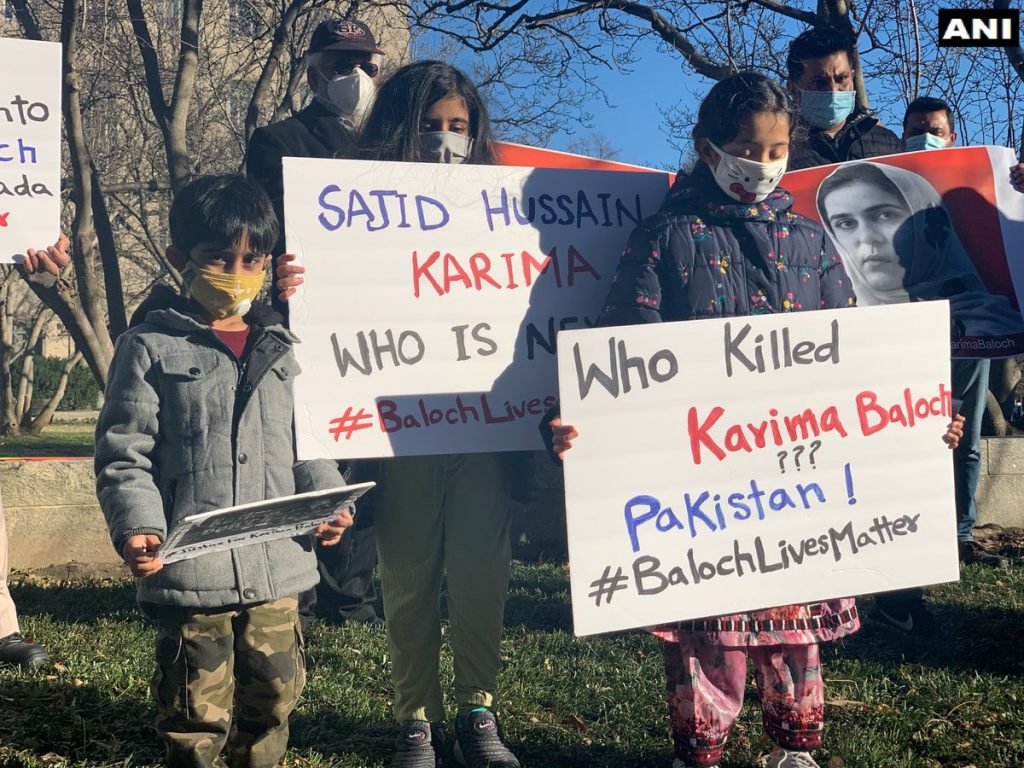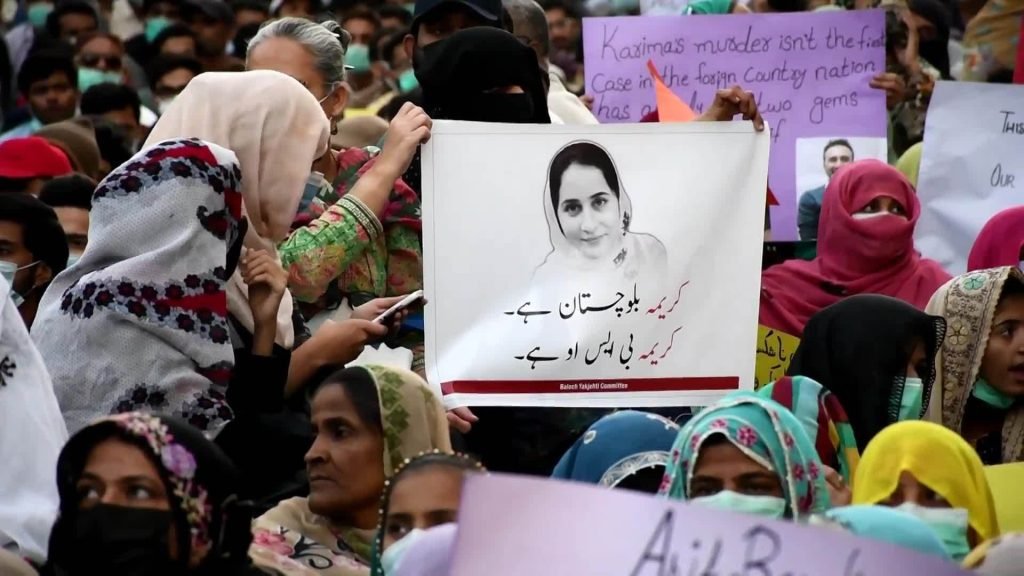Snuffing out Baloch Activists

“The Danger to my life was increasing daily”
Pakistan’s dirty war against its own people continues unabated. This time the target of its indiscriminate eradication of Baloch activists was prominent student leader Karima Mehrab Baloch. “I feared for my life and the danger to my life was increasing daily” This is what Karima Mehrab’s stated in her asylum claim. Her fears proved right. A former chairperson of the Baloch Students Organisation-Azad (BSO-Azad) Karima lived under refugee status in Canada since November 2015, because she had been targeted for her activism in Pakistan. Missing since Christmas eve, her body was found a day after Christmas in Toronto. Fellow Baloch and other minorities from Pakistan say she had got several threats for her activism against the Pakistan government. Baloch diaspora have been holding protest rallies across Europe and Canada calling for a proper investigation into her death, as she is the second prominent Baloch campaigner to be found dead under mysterious circumstances. Earlier in April 2020 the body of Baloch journalist Sajid Hussain Baloch was found outside Uppsala in Sweden, weeks after he had gone missing.
The BSO is considered the lead organization for all progressive Baloch thinking and plays a major role in forming Baloch political alliances. consequently, as its president Karima was a leading figurehead. Her role assumes even more significance when one considers that Baloch society is highly gender restrictive, and Karima as a woman overcame the barriers of patriarchy with tremendous courage to spearhead female youth activism. A few years ago she was quoted to have stated, “And that’s what’s so striking. In a region where women are for the most part neither seen nor heard, they are now not just silent supporters of the separatist movement: they’ve become its leaders.” Her disappearance is certainly not an isolated incident. Her percussor in the BSO, chair Zahid Baloch was abducted in 2014, after which she rose in the ranks of the organization.

Requesting the United Nations to intervene, the Baloch Human Rights Council (BHRC) in a letter has said Pakistan has “responded violently to the genuine demands of the Baloch people”. Toronto Police had said they do not consider Karima’s death as suspicious. Executive president of BHRC Naseer Dashti, in his letter to UN Secretary-General Antonio Guterres, has urged that, “Her family and political friends believe that Pakistan secret agencies are involved in the death of Karima Mehrab and have rejected the initial report of the Toronto police.” If the record of security forces in the suppression of Baloch activism is anything to go by, it would be naïve to rule out the role of Pakistani intelligence/security agencies in the deaths of Karima, Sajid Hussain and many others.
Pakistani Security Agencies and the suppression of Baloch voices
While it is now a known fact that Pakistan prevents the dissemination of news about Baloch activism, the apathy of the international community to the sustained Orwellian repression of an entire people remains lamentable. The Punjabi dominated Pak-military, and Pakistan’s military-run political system, has systematically subjugated any demand for political or social justice from the Baloch community. This repression which reached alarming proportions under Gen. Perverz Musharraf who famously threatened the Balochis with “This time you won’t even know what hit you,” continues even after his exit in 2008 with the military retaining the dominant decision-making authority on any issue Balochistan.
Methodical Misinformation by Pakistan
The Pakistani state methodically mingles any inferences of extra-judicial killings of Baloch activists with peripheral issues of insurgency, terrorism, the Baloch-Pashtun divide security of its CPEC corridor. Applying diversionary tactics to justify its own oppressive actions in the province, Islamabad accuses Delhi of subversive activities, funding and arming the Baloch insurgents. In 2015 former Army Chief Gen Raheel Sharif warned “foreign governments and intelligence agencies” against their involvement in the insurgency in Balochistan. Skimmed over as Indian conspiracy against Pakistan, the consistent killings of Baloch leaders are a matter that receives scare attention in international circles. The fact that Islamabad has failed to follow up these concocted claims with concrete proofs indicate that they are misinformation meant to deflect the focus of the observers from the appalling human rights abuses inflicted upon ordinary Balochis. This ensures the whitewashing of its own tyrannical suppression of the legitimate demands of the Balochis and a hate-fixation of its domestic audience with India.

Fueling a Sectarian Divide in Balochistan
Pakistani military also tries to appease the Pashtun mullahs in the eastern part of the province, playing the age-old divide and rule game in order to retain the edge. The Pakistan Army has shrewdly allied with groups like the Sipah-e-Sahaba Pakistan (SSP) and Lashkar-e-Jhangvi (LeJ) to counter the secular Baloch insurgency, in line with a Sunni Islamist narrative. Baloch nationalism which was markedly secular in character, almost never invoking Islam in its rhetoric has begun to witness high levels of sectarian violence. The recent killing of eleven coal miners of the Shia Hazara community were by Islamic state militants, sharply brings out the sectarian angle to the violence. According to a 2018 report by Pakistan’s Commission for Human Rights 509 Hazaras have been killed in incidents of sectarian violence since 2012. While it is true that the Hazara community as an ethnic minority faces persecution in Balochistan; the role of state agencies using terror groups like LeJ as strategic assets to fuel unrest in Balochistan cannot be ignored.
Response of the international Community
Further the fabrication campaigns run by Pak intelligence agencies for decades had led to the current state of unawareness that marks the international community’s position on Baloch affairs. What’s disturbing is the silence and in certain instances the ‘sympathy’ that is extended to the Pakistani authorities for its perceived struggles with Baloch insurgency. In 2016 Karima’s asylum claim was put on hold by the Canada Border Services Agency pending the outcome of an inadmissibility hearing by a refugee board tribunal in early 2017 on the grounds that she had engaged in “subversive” acts against “democratic Pakistan.” This was peculiar because although banned by Islamabad the BSO it is not among the terrorist entities listed by the Canadian government.
Progressive teachers, poets, leaders have all been targeted. Prof. Saba Dasthyari gunned down in 2011; Sabeen Mahmud killed in 2016 BNM leaders Gulam Mohammed Baloch and Lala Munir alongwith BRP leader Sher Muhammad Baloch abducted and killed in 2009, later their families met a grisly fate with Gulam Mohammed’s family burned alive – are just a few examples of the fate that awaits Baloch activists. Within Balochistan looting, torching, shootings, enforced disappearances have commonplace, but lately the instances of suspicious deaths of Baloch activists in exile has also become a regular occurrence. That even those who have chosen the path of peaceful struggle are eliminated in such clandestine fashion, demonstrates the paranoia of the Pakistani security agencies regarding the dispersion of Baloch nationalism.
Unless the international community begins condemning Pakistani-state sponsored killings of Baloch activists, who are termed as terrorists or agents of international intelligence organisations, this unabashed loss of young lives will continue with impunity. Canada should be mindful that a credible investigation into the suspicious death of Karima would be a reflection of the integrity of its law enforcement agencies. An improper closure of the case surrounding the circumstances of her death, ironically provides further evidence of the perils surrounding Baloch activists, something that Karima had been fighting for throughout her young life. Being committed to the cause of human rights for Balochi people was a to knowingly walk into a deathtrap. In her last tweet on December 14, 2020 days before her disappearance she had shared a news report by The Guardian titled ‘Kidnap, torture, murder: the plight of Pakistan’s thousands of disappeared’. Her dastardly assassination thus itself becomes a powerful symbol of Karima’s contentions. The wanton destruction of the human potential by targeting of young brave souls like Karima is perhaps the saddest aspect in the silencing of Baloch voices.



















